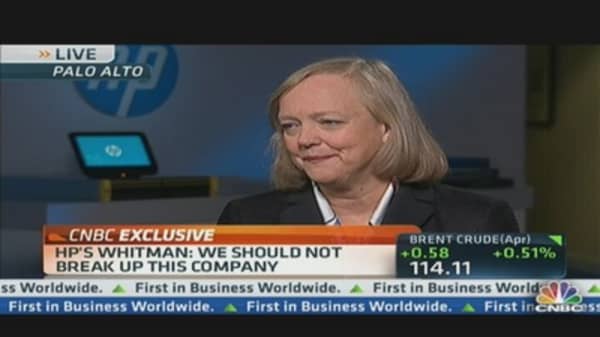Thursday, when the company reported better-than-expected earnings, the company showed that the plan is working, Whitman said.
(Read More: HP Earnings Beat Street, CEO Says Overhaul Taking Hold)
"We put down a very good deposit towards our full year performance," she said. "There were some very good bright spots in our performance, but we've got a lot of way to go. I've been very clear, this is a multi-year journey, the turn-around of HP."
Last quarter, the company took a write-down on Autonomy, which the company acquired in 2011 for $11.5 billion. Whitman said she is more confident than ever that the accounting charge stemmed from Autonomy's misleading financial information.
"We said that there was misrepresentations of the financial conditions of the company, and what we have learned since then we feel even more strongly about those allocations and the Department of Justice and the SEC and a number of enforcement agencies are taking up this case," she said. "The wheels of justice turn slowly, but we're confident that we will be proven right."
Mike Lynch, the co-founder of Autonomy who sold the company to HP, has defended himself and his former company. Lynch told CNBC in November that the mismanagement of Autonomy came after HP took over and that he was shocked by the allegations.
(Read More: Autonomy Founder 'Shocked' by HP Allegations of Fraud)
Whitman said that one of the biggest headwinds HP faces now is the rapidly changing personal computing business, or the PC business.
She said that HP's personal computing division engulfs all forms of computing, including tablets and smartphones. While HP likes the overall personal computing market, she said, it must reallocate resources to meet the demand for the transition taking place. And it also has to adopt a multi-strategy operating system strategy.
"Everyone wants to create, consume and share, so we like the overall market. There is a transition from more traditional form factors to new form factors. There is also a transition from one operating system to multi-operating systems and we are pursuing a multi-operating system strategy," Whitman said. "We've got to reallocate resources from just our PC business to mobility business, from one operating system to multi-operating systems, and we have to allocate more resources to services because profit pulls are shifting here."
Recent reports have claimed that HP is moving away from using Microsoft's operating system solely for its tablets and is adopting Google's Android platform, but HP has not officially confirmed the reports.
(Read More:HP Working on Android Tablet: Reports)
The changes in strategy — like multi-operating system adoption — are necessary to compete in today's market, she said. And while the transition period is not easy, it's unavoidable.
"This is some of the biggest shifts in technology that I've seen in my career," Whitman said. "When you run a big technology company like this, there are these transitions and I think because of the change of the CEO and the drama that happened at this company, those transitions maybe weren't handled as well as they could have been, but that's part of being in the technology business. You are always managing declining products and products that are new and changing the game."





